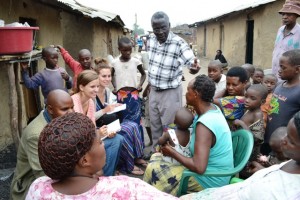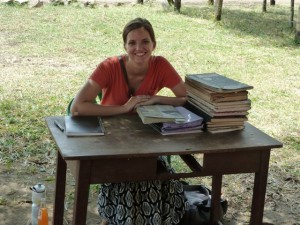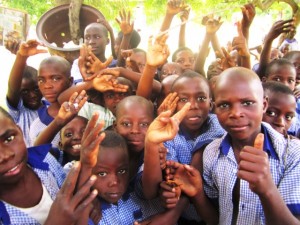By Shehtaz Huq ’14
As a sophomore EXCEL Scholar, Kelsey Lantz ’13 (Washington, Pa) wanted to find empirical raw data to plug into the computer model she’d been developing with Kristen Sanford Bernhardt, associate professor of civil and environmental engineering, to calculate the costs of maintaining rural water systems.

Kelsey Lantz ’13 meets with residents of a village outside of Kampala.
Her research led her to a small Norwegian organization, too understaffed to send her the numbers relating to the financial upkeep of the five rural water systems its maintains in western Uganda. When she was told that the files could not be sent to her electronically, Lantz found a way to get to them anyway—and two years later, ended up spending her summer in Uganda courtesy of Lafayette’s Jeffrey B. Havens Memorial Fund Award and the Grand Challenges Scholar program.
Lantz’s past summer was spent working with Fontes Foundation, an NGO that maintains charity-funded rural water projects.
“Most of my time there was spent in the office in Kampala going through ledgers and making sense out of their cost data,” Lantz says. “During trips to villages, I was able to discern a relationship between a water committee’s commitment to the system in their community and the corresponding service delivery within the village. This enables me to compare effectiveness of management between the villages.”

Kelsey Lantz ’13 reviews water system documentation.
A double major in international affairs and engineering studies, Lantz uses her interdisciplinary education to take a holistic approach.
“I’m not just looking at a technical or social issue,” she says. “The project involves engineering, economics, government, and the ability to see the big picture to complete an effective case study about maintaining the enabling environment of charity-funded rural water systems.”
As for her day-to-day life in Uganda, Lantz admits that the experience was eye-opening.
“I slept under a mosquito net and took a malaria pill every day,” says Lantz. “In the villages, there was no electricity or running water. The villagers are very poor and they have very little, but their generosity was humbling. I had nothing to offer them, but I was always treated with utmost respect as I toured the villages, interacted with the water committees, and interviewed the water users.”
Lantz faced challenges in not only adapting to the rural lifestyle but also in finding a more nuanced focus for her research project.
“I started out being too ambitious and eager to study as much as possible,” she says. “It was difficult to accept that I couldn’t do it all and to really hone in on the specialization of the research topic. I also had to learn to slow down and understand that a traffic jam can make me an hour late or that the internet might be down for an entire afternoon, but that’s the pace of life here and that’s OK.”

Schoolchildren from the Katunguru Primary School, which has treated, clean tap water. The school was the location of a water seminar for the villages that the Fontes Foundation serves.
“By the end of the summer I was getting around the city like a pro and bartering with the locals at fruit stands like it was my job,” she adds. “I was also able to flourish with research and ask exactly what I wanted to find out and how I was going to do it.”
For her outstanding work, Lantz has been featured in the Fontes Foundation’s newsletter. She has also been selected to submit a scholarly research article for the journal Water Alternatives.
“Living alone in Africa for two months enabled me to pursue opportunities that I wouldn’t have previously considered,” she says. “I don’t have postgrad plans finalized yet, but I’m now considering options abroad.”



1 Comment
As a retired chemist who spent the last 5 years of his working life doing trace metal analysis on water samples, it pleases me to see a bright young Lafayette student doing her part to improve water quality. In the U.S. we tend to take the availability and quality of our water as a given almost, but we forget that it is not so easily handled in other parts of the world. Kelsey has recognized that it takes more than a knowledge of the technical aspects operation to have a successful water system. Collecting the data, whether by first hand or by checking local records as she has done is the first step towards understanding all the dynamics involved. Bravo Kelsey!
Richard Coleman Class of 1971 B.S. Chemistry
Comments are closed.